King Arthur
 for intense battle sequences, a scene of sensuality and some language.
for intense battle sequences, a scene of sensuality and some language.
Reviewed by: Sheri McMurray
CONTRIBUTOR
| Moral Rating: | Average |
| Moviemaking Quality: |
|
| Primary Audience: | Adults |
| Genre: | War Action Adventure Drama |
| Length: | 2 hr. 10 min. |
| Year of Release: | 2004 |
| USA Release: |
July 7, 2004 (wide) |
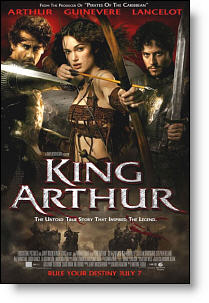
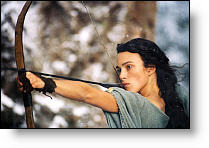
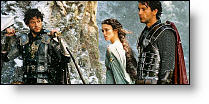
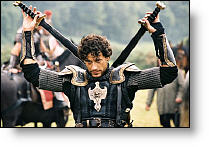
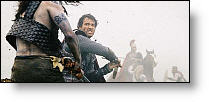
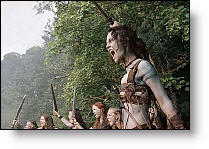
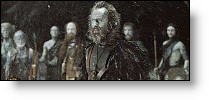
| Featuring |
|---|
| Clive Owen, Stephen Dillane, Keira Knightley, Hugh Dancy, Ioan Gruffudd |
| Director |
|
Antoine Fuqua |
| Producer |
| Jerry Bruckheimer |
| Distributor |
“Rule your fate.”
It’s 300 A.D. and the Sarmatians to the east of Britain are all that’s left of a warring cavalry. So impressed with their agility and prowess at battle, the Romans decide to spare them their lives in return for just one little favor. All their young sons and their son’s sons are taken from their families and forced to serve as knights for Rome for 15 years each. Of course, they may return at the end of their service to Rome, unless they happen to die in battle, which will most likely be the horrible outcome.
It is into this dreary and sad history we are introduced as Lancelot (Loan Gruffudd) is shipped off from his village as a pre-teen boy knowing full well he will never see his family again. It is a rough life. A life or death struggle just to make it through each 24 hour period.
As the dawn of his 15 year servitude crests, we are forced to engage with Lancelot in his final bloody battle before his freedom papers are given him, and he may return home a free man. Miraculously, Lancelot and his forged family of knights have survived this tour of duty to Rome! They have lived and died along side one another in these years under Roman Christian rule. There are but these brave left: Galahad (Hugh Dancy), Dagonet (Ray Stevenson), hawk-loving Tristan (Mads Mikkelsen)—and Arthur (Clive Owen), to whom they have all have pledged their iron-clad allegiance.
It is with high hopes they travel to meet with the Pope’s advocate to accept their papers to travel through Roman Britain unharmed under the protection of His Grace. Unfortunately for them, the home office in Italy has one more campaign for them to run, and if they are successful (which means if they don’t die while carrying it out) then, and only then, will they finally be allowed to quench their thirst for freedom.
Arthur, who had a Roman father and British mother, is an idealistic Christian soldier who truly believes God has sent him into this world to protect and win in Roman battles. He finds through the course of this final campaign, that Rome is not the place of equality and freedom his most beloved father had imbibed within him. The realm he so honorably served and protected for these past grueling years in fact no longer exists. The film traces Arthur’s evolution from idealistic dreamer to practical hero.
We do get a glimpse of the famous Round Table within the walls of the British castle/fortress to which Arthur refers is round “…for men to be men they must all be as equal” showing no head at this table, but an equal place for all. He also prays in earnest to God to have his life the sacrificed rather than any of his men, so that they would be able to return to their homes and families.
Lancelot, his most trusted friend, overhears this plea and asks why he beseeches this “God” and not confide in him instead. Arthur responds that it is his faith that protects him. Lancelot responds by saying he trusts no man on his knees. Arthur shows true humility and says perhaps his prayers will put an end to this war. Being the realist he is, Lancelot sadly states there will always be battles in this world.
These knights willingly go off upon this one last mission, not because of their allegiance to Rome, but because of their respect and honor to Arthur. It is here that the sacrifice of faith and friendship is demonstrated in these brave men. Into the grip of the Saxons who have pillaged, raped and murdered their way across Britain they ride to rescue a Roman royal family and bring safely back the son, Arious, to the safe haven of the Roman Pope. They are ambushed in the forest by a fierce warrior tribe of Woads led by a mystical Merlin, but much to their surprise, are spared their lives.
Arthur and his men find the servants being flogged, beaten and tortured in a dungeon at the home of the Roman official he has been charged to rescue and is appalled this is being done in the name of Christianity. It proves more than just the honorable thing to do now, but the real Christian thing to do is save his British countrymen from the very rulers they have placed their faith in to protect them. Arthur also frees and falls in love with a beautiful, confident Woad princess, Guinevere (Keira Knightley). In this telling, Arthur and Guinevere are true loves and Lancelot, though smitten with Guinevere, never makes any advance towards her.
The Saxon army is headed by the ruthless warrior king Cerdic (Stellan Skrsgard) who will stop at nothing in his rampage of killing and burning to eventually meet and defeat Arthur and his knights. The scene where the seven knights aided by Guinevere’s expert archery, face down a whole battalion of 500 Saxon’s on a frozen river bed, is well worth the price of admission.
We are shown the “real” account of Excalibur and how this sword of renown was actually pulled from the burial mound of his father by Arthur as a young boy, to be used later in his soldiering life to avenge the death of his mother.
This is no fairy tale account of King Arthur, but an attempt at realism—probably more like the rugged lives actually lived back in this ancient time. Although the writers did take many liberties with the classic legend, who King Arthur really was is so clouded by now, who is to say this account is not more closely woven to reality.
LANGUAGE, SEX AND VIOLENCE: The battle sequences are vividly graphic and lengthy, therefore I would not suggest this film for children under 13. There was some use of medieval swearing, but it seemed appropriate for the movie’s theme of reality. The film included a scene where rape was inferred, but nothing actually seen. There is also a sex scene between Arthur and Guinevere—sadly, just an act of lust and not the true love for which the story really called.
Over the course of its blood thirsty battles and through to its conclusion, this film provides a somber look at how Christian ideals can be abused—crushing and breaking innocent lives in the process. As history has often proved, it takes but one brave and committed human being to change the course of the times and bring relief to those who are harshly oppressed.
In the end, Arthur acknowledges that his best friend Lancelot gave his life for the freedom of others. He decrees that “deeds in themselves are for nothing except they be lead by a higher power.” Many have given their lives throughout human history for a better existence for all. As Christians we are finely tuned to the sacrificial death of our Savior, Jesus, for the sins of all mankind. How relevant the truth that there is no greater love than a man who gives his life freely for the sake of his friend’s. Through to the end Arthur never gave up his belief in God, even when other’s questioned, Arthur’s faith remained strong and true. I found this the best, most profound example overall.
See list of Relevant Issues—questions-and-answers.


On the positive side, in the story Merlin was not a spiritual leader to Arthur or even a “dark” man, rather he was a man who conceded to Arthur’s wisdom and experience. Only once did he point out to Arthur some fallacy in his manner, saying that it was Arthur’s love for the people, not his hatred of the enemy that did and should spur his quest. Also, Excalibur has no spiritual power; Arthur seeks God’s guidance in matters, not the swords.See all »
[Average/3½]
As far as filmmaking goes, I was expecting the level of energetic, enthusiastic, and diverse movie like Pirates of the Carribbean, but I was disappointed. (I made this comparison because both were produced by Jerry Bruckheimer.)
[Good/3]
[Average/4]
Disappointingly, the producer apparently felt the need for a physical scene between Arthur and Gueneviere. (This being out of context with the otherwise devout Arthur’s behavior.) Certainly, the attraction was evident without the scene.
There is a lot of violence, although the majority in the context of war. Throughout the picture, Arthur values his faith and does not hide his beliefs, despite much criticism from non-believers and errant believers alike.
[Better than Average/4½]
My high hopes for the movie, “King Arthur,” were dashed before the film ever opened in theaters, by critics who were panning the movie from advanced screenings. So, I stayed away while it was in theaters and most definitely passed on special discounts on the week it was released to DVD. After finally getting around to renting a copy, I am left with just one burning question—Why do I listen to movie critics?See all »
[Better than Average/4]
[Very Offensive/5]
For me, the most objectionable aspect was the negative portrayal of orthodox Christianity. Arthur is shown as a follower of the heretic Pelagius, who rejected the Christian teaching on original sin. Pelagius is given a fictional martyr’s death in the film (in reality, no-one knows how he died) because he believed in “freedom.” That’s right, Hollywood doesn’t trust the audience to understand theological debates, so they get reduced to that Humpty Dumpty word “freedom,” which now seems to mean whatever the person deploying it wants it to mean.
In contrast, St. Germanus of Auxerre is shown as venal and self-serving, even allowing a decoy to be killed at the beginning of the film in order to save his own skin. In other words, it is a movie where saints are evil and heresy equals freedom.
[Average/3½]
Back to the movie—Arthur sees Pelagius as a hero promoting the doctrine of “free will.” This belief in free-will is then extended to the political, religious, and social levels also as liberal-minded Arthur permits his knights of the round table to remain pagans if they so desire, respecting their “freedom” to choose. Hmmm… I didn’t realize that Arthur was aware of the First Amendment of the Constitution! (Revisionist history really irks me.)See all »
[Average/3]
As for production values—it looks impressive, but like many such “historical epics” nowadays, the superficial “look of history” belies something of a lack of authenticity, and a lot of general silliness. For instance, the Anglo-Saxons (Cerdic and his fellows) come across as proto-Nazi racial purists—why? Probably for no other reason than that they were from Germany—and apparently, German equals Nazi.
Nor is it the only xenophobic implication. Pretty much anyone who is not a Pagan or a Briton is considered bad—the Romans condemned as evil Imperialists, in an unwelcome hint of modern, liberal judgmentalism.See all »
Moral rating: Offensive / Moviemaking quality: 4
Also, even though the war scenes are not as graphic as other war movies, the content of violence is such that, in my opinion, it should have been rated R. There is one scene where a man is trying to rape a woman after a conquest. The captain of the army stops the man, not because rape is wrong, but because he considers it a weakness to mix with his enemies. Instead, he has the woman killed. Again, you don’t see nudity, but the subject matter is not appropriate for children or even teenagers.See all »
[Average/4]
[Average/1½]
Even Arthur, the hero, in the end, turns his back on God and engages in fornication the night before he goes into battle and then marries the same woman in a pagan wedding after yelling at God because some of his knights died… I guess the faith he had talked of earlier was only skin deep.
The pagan Merlin is shown as having more wisdom and a truer understanding of Love and the motivation of the heart than the “Christian” Arthur or any other Christian portrayed. As a Christian I regret the money I spent to watch this film and I believe you would too.
[Very Offensive/4]
[Average/5]
As for content, the love scene was too long, not to mention ridiculous. The violence, while not bloody, was still brutal. There was a scene of attempted rape (true to the times, but unnecessary). Kiera’s character dons the most illogical outfit I’ve ever seen in a genre film. It’s almost non-existent.
If a woman like her wore an outfit like that on the field in those times, the battle would never take place. Everyone would chase her around instead.
Arthur is portrayed as a model Christian amongst evil ones, but he allows immoral violence from his men, and even engages in it himself. I find it hard to believe a man with any spiritual integrity would stand for killing non-combatants without mercy (no matter how evil they are). It’s God’s job to avenge. Arthur encourages blood-lust, and also engages in fornication. Is this a man of God?
I say see it at least once in your life but don’t bother with the theatre. It certainly deserves a remake someday. This story makes way more sense than the “Once and Future King” version.
[Very Offensive/3]
[Better than Average/4]
[Good/4]
There was some violence, all of it involving swords and bows, It would have been unrealistic not to have violence in it and the movie should be commended at keeping it pretty clean. There was a scene of sensuality in the movie but its over quickly.See all »
[Average/4½]
The story of thinking your trials are over and then realizing they aren’t is something every Christian can relate to, and it’s fascinating to see the way the characters handle such scenarios. There was some objectional material which was, although probably realistic and not too overdone, was probably not necessary to the film.
Some of the knights make some raunchy jokes, and there is one sex scene that reveals a bit of female skin, but other than that, most of it is tastefully done and appropriate for the situation. This movie was very enjoyable, not very predictable, and had a satisfying ending.
[Average/4]
[3]


The scene with Arthur and Guenievere was rather long, but for the most part the romantic themes were eliminated. Her outfit (or lack thereof) in battle may catch some negative attention, but the scene was edited a great deal, so she’s barely seen in it. The violent scenes in the film are not nearly as bloody or graphic as other movies of the same genre, which makes it less objectionable.See all »
My Ratings: [Average/3]